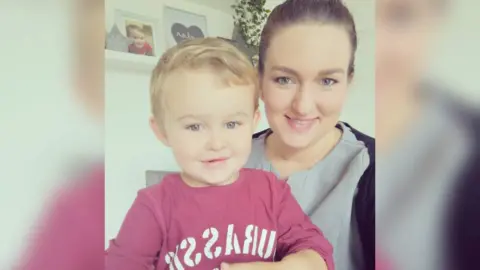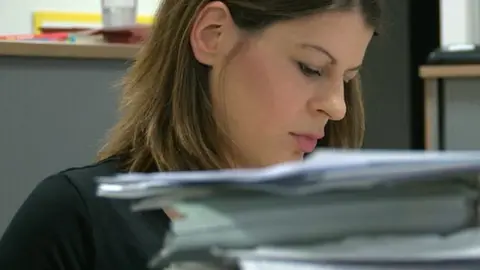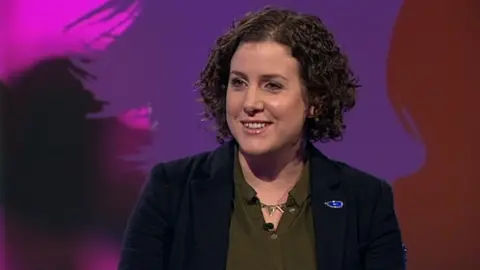Gender equality: 'We value men's work more than women's'
"We culturally value jobs done by men more than women", a leading gender-equality charity says.
To address this, investment is required in childcare and social care to enable women to achieve their economic potential after coronavirus, Chwarae Teg chief executive Cerys Furlong said.
The Welsh Government called rebuilding "the biggest challenge we have faced".
Ms Furlong said there must be "a greener, more sustainable recovery" after the pandemic.
"And one that's more equal and more balanced," she added.
"So that will mean tough decisions about which types of industries Welsh Government can support with limited resources.
"Core to that is really valuing care, and particularly unpaid care, women's work, which we know and have seen very clearly is absolutely essential, not just to the economy, but to our health and wellbeing."
Marged Davies owns a beauty salon in Carmarthen and is mother to three-year-old Gruff.
 Marged Davies
Marged Davies She said it had been a struggle to look after Gruff during lockdown and living off her savings.
"At times it's been really difficult," she said.
"I'm trying to give Gruff a positive experience at home but I'm also worrying about the future of the salon. I've had no income and I've got five girls working for me on furlough. I don't know how long this is going to go on for."
"I've been living off my savings for four months and that's almost run out."
Ms Davies said she depended on grandparents and, without their support, she would not be able to get back to work at all.

Studies by the Institute for Fiscal Studies show women are among the worst hit by the pandemic - both financially and in terms of increased workload at home.
Coronavirus has exacerbated existing inequalities according to Rachel Cable, director of Oxfam Cymru.
She said: "What we've seen during this pandemic is that women are picking up a greater proportion of unpaid care through looking after relatives or looking after the children and, of course, women make up the great majority of people who work in the NHS and in the social care sector.
"And whilst we've been standing on our doorsteps on Thursdays clapping, the reality is that those carers just aren't being valued at the level that they should be."
Prime Minister Boris Johnson announced at the end of June that his government would "build, build, build" its way to economic recovery.

Ms Furlong said she thinks it's a "macho" and simplistic" argument, adding: "So what does that mean?
"It means construction jobs, it means engineering and all of those things we need, of course, but we also need social infrastructure.
"We need investment in public services, we need social really good social care; really crucially, we need childcare to allow women to get back to work.
"So I just thought it was such a simplistic message, but it's a much more nuanced argument than 'build, build, build'."
Care investment
According to gender equality think-tank the Women's Budget Group, if the UK invested in care rather than construction, 2.7 times as many jobs would be created, 6.3 times as many for women and 10% more for men.
The report argues that investing in care is economically beneficial, not only because it generates employment, but also because it helps create a healthier, better educated and more productive population.
A Welsh Government spokesman said: "The rebuilding of Wales following coronavirus represents the biggest challenge we have faced. It is not enough to think in terms of recovery. We must think in terms of a new normal, so that we can build back better to ensure our future is fairer, more inclusive and more sustainable than our past.
"We know the coronavirus pandemic has had a disproportionately negative impact on some communities, including women, and our efforts will put their interests centre-stage, as we seek to ensure the people of Wales, particularly those in impacted groups can maximise their economic potential."
For more on this story, watch Politics Wales on BBC One Wales at 10:15 BST on Sunday.
